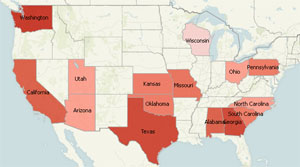NEWS ROUNDUP
Everett makes most 777X sense, TPP backlash, tipping au pairs…
Monday, December 9, 2013
BOEING
 ► In Sunday’s (Everett) Herald — Landing the Boeing 777X: How 15 states compare — Boeing won’t comment on how it plans to evaluate the states’ bids for 777X work, which are due Tuesday. But Everett is the best fit on paper, according to several aerospace industry analysts and The Herald’s own analysis of potential sites. The longtime home of Boeing widebody jet production has the overall edge over contenders because of an existing skilled workforce, education and training programs, regulations, and transportation, among other criteria that likely will shape the company’s final decision.
► In Sunday’s (Everett) Herald — Landing the Boeing 777X: How 15 states compare — Boeing won’t comment on how it plans to evaluate the states’ bids for 777X work, which are due Tuesday. But Everett is the best fit on paper, according to several aerospace industry analysts and The Herald’s own analysis of potential sites. The longtime home of Boeing widebody jet production has the overall edge over contenders because of an existing skilled workforce, education and training programs, regulations, and transportation, among other criteria that likely will shape the company’s final decision.
► In today’s LA Times — Boeing families in Seattle area feel spurned over 777X project — Shannon Ryker is a third-generation employee of aerospace giant Boeing Co. She followed her grandfather into the huge plant in nearby Everett. And her father. And her Uncle Bob. So it wasn’t easy for the 37-year-old mechanic to sit down in her crowded apartment here on a recent Sunday and write to Boeing management about her growing disappointment.
► MUST-READ in Sunday’s Seattle Times — Catering to Boeing’s corporate demands is beneath us (by Danny Westneat) — “Company preference is toward a location that will share in the cost of all capital expenditures,” Boeing wrote in its wish list to states competing for the 777X. Now that’s socialism. It’s the corporate variety, and it isn’t all bad, what with the good-paying jobs and boost to the local economy. But having the public buy the means of production — socializing the capitalists’ risks (though definitely not their profits) — is a far cry from free enterprise. Rarely do you see the real American socialism so baldly stated in a business document.
LOCAL
 ► In the Seattle Times — Apprenticeships: great jobs and good pay — but scarce — A new national report is urging states and the federal government to expand the use of apprenticeships — work that couples on-the-job training with class work, usually at a community or technical college. The report credits Washington as having a robust apprenticeship program.
► In the Seattle Times — Apprenticeships: great jobs and good pay — but scarce — A new national report is urging states and the federal government to expand the use of apprenticeships — work that couples on-the-job training with class work, usually at a community or technical college. The report credits Washington as having a robust apprenticeship program.
EDITOR’S NOTE — Remarkably, this story does not include the word “union” at all. It’s almost as if employers and the state government came up with this bright idea.
► In the Bellingham Herald — Coal, oil shipping could benefit from passenger rail improvements in Washington — President Barack Obama’s high-speed rail program was supposed to deliver faster and more frequent passenger trains to communities across the country. But some of the $10.1 billion in funding for that program also could benefit one of the nation’s largest freight railroads.
STATE GOVERNMENT
► In the Columbian — Oregon governor: Federal money remains available for CRC — The governor’s comments mean that a pot of money called the New Starts fund remains available. CRC proponents are counting on $850 million from the fund for the light-rail portion of the $2.6 billion project, which would replace the Interstate 5 bridge over the Columbia River between Portland and Vancouver.
 ► In today’s Seattle Times — New Senate Democratic leader aims to put caucus back on top — State Sen. Sharon Nelson has a tough job this coming session: proving that her caucus still has clout. She is taking over at a time when her party is at its lowest ebb in 16 years. Bill Clinton was still president the last time Senate Democrats had only 23 members.
► In today’s Seattle Times — New Senate Democratic leader aims to put caucus back on top — State Sen. Sharon Nelson has a tough job this coming session: proving that her caucus still has clout. She is taking over at a time when her party is at its lowest ebb in 16 years. Bill Clinton was still president the last time Senate Democrats had only 23 members.
► In the News Tribune — Owners of former state liquor stores struggle to stay in business — Some 19 months after privatization, more than 60 percent of those who bought former state stores are out of business, and most of the remainder are headed in that direction, according to the Washington Liquor Store Association.
► In the P.S. Business Journal — Washington exchange CEO’s 13% raise exceeded what was planned — When the CEO of the Washington state health exchange received a 13 percent raise last month, that was more than double the 5 percent maximum performance increase that officials had previously said he could receive in 2013, according to documents obtained by the Puget Sound Business Journal.
AFFORDABLE CARE ACT
 ► In today’s NY Times — Amid uproar over health law, voices of quiet optimism and relief — For all of the problems, people are enrolling. For many, particularly people with existing medical conditions, the coverage is proving less expensive than what they had. Many others are getting health insurance for the first time in years, giving them alternatives to seeking care through free clinics or emergency rooms — or putting it off indefinitely.
► In today’s NY Times — Amid uproar over health law, voices of quiet optimism and relief — For all of the problems, people are enrolling. For many, particularly people with existing medical conditions, the coverage is proving less expensive than what they had. Many others are getting health insurance for the first time in years, giving them alternatives to seeking care through free clinics or emergency rooms — or putting it off indefinitely.
► AT TPM — Americans discover they’re trapped in GOP’s Medicaid expansion trap — With HealthCare.gov working better, more and more people are finding out that they probably won’t be able to get covered because their states, all of which had a Republican-controlled legislative chamber or governor, have refused to expand Medicaid.
FEDERAL GOVERNMENT
 ► In today’s Huffington Post — Obama faces backlash on new corporate powers in trade deal — The Obama administration appears to have almost no international support for controversial new trade standards that would grant radical new political powers to corporations, increase the cost of prescription medications and restrict bank regulation, according to two internal memos obtained by The Huffington Post.
► In today’s Huffington Post — Obama faces backlash on new corporate powers in trade deal — The Obama administration appears to have almost no international support for controversial new trade standards that would grant radical new political powers to corporations, increase the cost of prescription medications and restrict bank regulation, according to two internal memos obtained by The Huffington Post.
► At AFL-CIO Now — While countries discuss TPP trade deal, AFL-CIO urges negotiators to consider working families — “After nearly four years of negotiations, the trade ministers are on the brink of finalizing the TPP. Government trade negotiators often speak of the importance of ‘momentum’ in such agreements, in order to provide ‘urgency’ to make ‘needed compromises.’ What they rarely speak of is the urgent need to make trade policy choices that will have immediate, positive impacts on the lives of people they are supposed to be representing.”
► In today’s Washington Post — Budget deal expected this week amounts to a cease-fire as sides move to avert standoff — The deal expected to be sealed this week on Capitol Hill would not significantly reduce the debt, now $17.3 trillion and rising. It would not close corporate tax loopholes or reform expensive health-care and retirement programs. It would not even fully replace sharp spending cuts known as the sequester, the negotiators’ primary target.
► In The Hill — Congress to unveil defense bill deal — The House is scheduled to complete its work for the year on Friday, giving members precious little time to finish. The bill to be presented to both chambers will basically be offered as a take-it-or-leave it bill.
► In today’s NY Times — The punishment cure (by Paul Krugman) — The Republican response to the unemployed is a mix of callousness and bad economics. Therefore, some 1.3 million American workers, many of them in desperate financial straits, are set to lose unemployment benefits at the end of December. Merry Christmas.
NATIONAL
 ► At Gawker — McDonald’s to employees: Don’t forget to tip your nannies — The latest tone-deaf advice from the you-just-can’t-make-this-%$#@-up “McResource Line” employee website: a tipping etiquette guide that suggests holiday bonuses for such common hired helpers as au pairs (one week’s pay or a gift from the family), housekeepers (one day’s pay), and pool cleaners (the cost of one cleaning). Don’t worry: McDonald’s didn’t forget about its employees’ dog walkers, massage therapists, and personal fitness trainers — they get a handsome tip too.
► At Gawker — McDonald’s to employees: Don’t forget to tip your nannies — The latest tone-deaf advice from the you-just-can’t-make-this-%$#@-up “McResource Line” employee website: a tipping etiquette guide that suggests holiday bonuses for such common hired helpers as au pairs (one week’s pay or a gift from the family), housekeepers (one day’s pay), and pool cleaners (the cost of one cleaning). Don’t worry: McDonald’s didn’t forget about its employees’ dog walkers, massage therapists, and personal fitness trainers — they get a handsome tip too.
► In today’s Washington Post — The return of the working-class hero (by E.J. Dionne) — There are moments when the arts take a top-down view of the world highlighting the contributions of the successful, the powerful and the influential. There will always be a place for this. But at other moments, the creators of culture take on the different task of looking at the world from the bottom up. This entails an acknowledgment that there would be no wealth without the efforts of those who labor. It is rooted in a spirit of solidarity. Once-forgotten people are suddenly remembered again.
TODAY’S MUST-READ
 ► At Huffington Post — Progressives must stand up against right-wing war on public employees (by Robert Creamer) — Every economic and political decision we make should be viewed through the lens of whether it reduces or increases that economic inequality. When it comes to public employee pensions and wages, the corporate elite tries to convince ordinary people that the choice is between “lavish” benefits to public employees or education for our kids. They play upon the resentment that most ordinary people feel that their incomes have been stagnant for three decades to pit them against middle class public employees. … It’s time for Progressives — and Americans of all stripes — to wake up and smell the coffee. Without a robust, efficient, well functioning public sector, our economy will fall behind in the world and our standard of living will drop.
► At Huffington Post — Progressives must stand up against right-wing war on public employees (by Robert Creamer) — Every economic and political decision we make should be viewed through the lens of whether it reduces or increases that economic inequality. When it comes to public employee pensions and wages, the corporate elite tries to convince ordinary people that the choice is between “lavish” benefits to public employees or education for our kids. They play upon the resentment that most ordinary people feel that their incomes have been stagnant for three decades to pit them against middle class public employees. … It’s time for Progressives — and Americans of all stripes — to wake up and smell the coffee. Without a robust, efficient, well functioning public sector, our economy will fall behind in the world and our standard of living will drop.
The Stand posts links to Washington state and national news of interest every weekday morning by 10 a.m.





